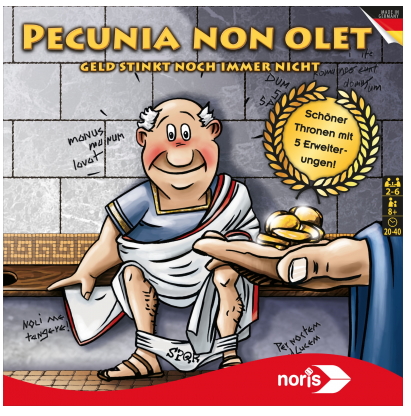
Vespasian's name still attaches to public urinals in France ( vespasiennes), Italy ( vespasiani), and Romania ( vespasiene). The phrase Pecunia non olet is still used today to say that the value of money is not tainted by its origins. When Titus said "No," he replied, "Yet it comes from urine" ( „Atqui ex lotio est“).

The Roman historian Suetonius reports that when Vespasian's son Titus complained about the disgusting nature of the tax, his father held up a gold coin and asked whether he felt offended by its smell ( sciscitans num odore offenderetur). It was used in tanning, and also by launderers as a source of ammonia to clean and whiten woollen togas. It’s been said that there are only two sure things in life. I haven’t the slightest idea why that comes to mind at the moment. The English dramatist George Chapman once said ‘The law is an ass’.

(The Roman lower classes urinated into pots which were emptied into cesspools.) The urine collected from public urinals was sold as an ingredient for several chemical processes. Tag: Pecunia non Olet SeptemDeath & Taxes. In fact, the literal sense of extreme poverty for piss-poor didn’t come along until a couple of decades later, which also provides another reason, if one were needed, that the story you quote is nonsense.Vespasian imposed a Urine Tax (Latin: vectigal urinae) on the distribution of urine from public urinals in Rome's Cloaca Maxima (great sewer) system. However, it’s a graphic literal reference to poverty as piss-poor was first used in a figurative sense, it's unlikely to have been influenced by the older idiom. The idiom appears in Nightwood by Djuna Barnes, published in 1936, so it does predate piss-poor. or a window to throw it out of, might wonder if this is the origin. Larkin’s letters, wrote Philippe Auclair, writer and broadcaster, were “very funny, very beautiful, and very sad the grace of an angel, the precision of a geometer, and the short-sighted, intolerant piss-poor idées fixes of a provincial buffoon”.Īmericans who know the idiom so poor he didn’t have a pot to piss in, sometimes in the fuller form. Piss-poor began life in a similar figurative sense for something that's third-rate, incompetent or useless, as it does in this recent example: Ezra Pound invented piss-rotten in 1940 (distasteful or unpleasant, the first example on record) and we’ve since had piss-easy (very easy), piss-weak (cowardly or pathetic), piss-elegant (affectedly refined, pretentious), piss-awful (very unpleasant) and other forms. Piss began to be attached to other words during the twentieth century to intensify their meaning. Though it is still classed as low slang by dictionaries, its mildly unpleasant associations have become blunted by time and familiarity. The current state of research suggests that it may have been invented during the Second World War, because the first examples in print date from 1946. However, the expression piss-poor is recent and has nothing to do with tanning.

Kami juga berkongsi maklumat tentang penggunaan laman web dengan media sosial, pengiklanan dan rakan analisa kami. Kuki Educalingo digunakan untuk memperibadikan iklan dan mendapatkan statistik trafik laman web. Vespasian’s son is said to have objected to the disgusting origin of the tax revenues, to which in legend his father replied pecunia non olet, money doesn’t smell, a tag that from time to time is still employed to argue that money isn’t tainted by its origins. Sinonim non olet dan terjemahan non olet ke dalam 25 bahasa. The long-gone French public pissoirs were given the name vespasiennes as a direct link to him. His famous aphorism Pecunia non olet (Money does not smell). The most famous taxer was the emperor Vespasian in the first century AD. The Romans, for example, collected urine for this purpose systematically and even put a tax on it. Urine has been widely used in many parts of the world in the preparatory stages of tanning, in particular to help remove the hair from hides before applying tanning agents. However, as with other tongue-in-cheek suggestions about origins, a grain of truth exists in it.

Can you offer real clarity?Ī It certainly might be a folk etymology, except that the piece is in its intention merely a mischievous attempt to deceive its readers. If you had to do this to survive you were ‘piss poor’.” This screams of folk etymology. Q From Bob Fleck: An item circulating online under the title Interesting History claims, “They used to use urine to tan animal skins, so families used to all pee in a pot and then once a day it was sold to the tannery.


 0 kommentar(er)
0 kommentar(er)
